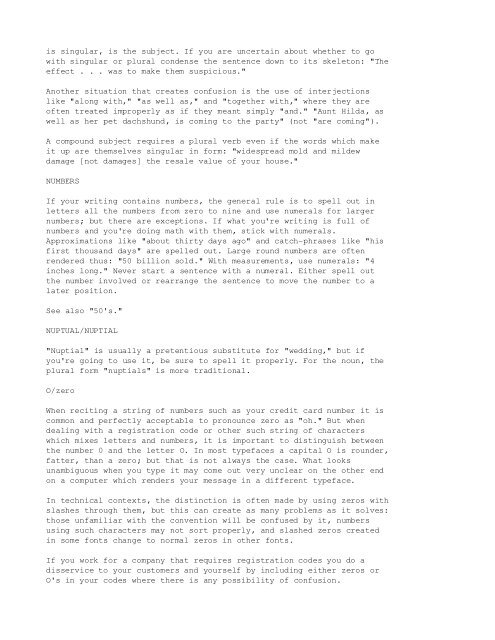Common_Errors_in_English_usage
Common_Errors_in_English_usage
Common_Errors_in_English_usage
Create successful ePaper yourself
Turn your PDF publications into a flip-book with our unique Google optimized e-Paper software.
is s<strong>in</strong>gular, is the subject. If you are uncerta<strong>in</strong> about whether to go<br />
with s<strong>in</strong>gular or plural condense the sentence down to its skeleton: "The<br />
effect . . . was to make them suspicious."<br />
Another situation that creates confusion is the use of <strong>in</strong>terjections<br />
like "along with," "as well as," and "together with," where they are<br />
often treated improperly as if they meant simply "and." "Aunt Hilda, as<br />
well as her pet dachshund, is com<strong>in</strong>g to the party" (not "are com<strong>in</strong>g").<br />
A compound subject requires a plural verb even if the words which make<br />
it up are themselves s<strong>in</strong>gular <strong>in</strong> form: "widespread mold and mildew<br />
damage [not damages] the resale value of your house."<br />
NUMBERS<br />
If your writ<strong>in</strong>g conta<strong>in</strong>s numbers, the general rule is to spell out <strong>in</strong><br />
letters all the numbers from zero to n<strong>in</strong>e and use numerals for larger<br />
numbers; but there are exceptions. If what you're writ<strong>in</strong>g is full of<br />
numbers and you're do<strong>in</strong>g math with them, stick with numerals.<br />
Approximations like "about thirty days ago" and catchphrases like "his<br />
first thousand days" are spelled out. Large round numbers are often<br />
rendered thus: "50 billion sold." With measurements, use numerals: "4<br />
<strong>in</strong>ches long." Never start a sentence with a numeral. Either spell out<br />
the number <strong>in</strong>volved or rearrange the sentence to move the number to a<br />
later position.<br />
See also "50's."<br />
NUPTUAL/NUPTIAL<br />
"Nuptial" is usually a pretentious substitute for "wedd<strong>in</strong>g," but if<br />
you're go<strong>in</strong>g to use it, be sure to spell it properly. For the noun, the<br />
plural form "nuptials" is more traditional.<br />
O/zero<br />
When recit<strong>in</strong>g a str<strong>in</strong>g of numbers such as your credit card number it is<br />
common and perfectly acceptable to pronounce zero as "oh." But when<br />
deal<strong>in</strong>g with a registration code or other such str<strong>in</strong>g of characters<br />
which mixes letters and numbers, it is important to dist<strong>in</strong>guish between<br />
the number 0 and the letter O. In most typefaces a capital O is rounder,<br />
fatter, than a zero; but that is not always the case. What looks<br />
unambiguous when you type it may come out very unclear on the other end<br />
on a computer which renders your message <strong>in</strong> a different typeface.<br />
In technical contexts, the dist<strong>in</strong>ction is often made by us<strong>in</strong>g zeros with<br />
slashes through them, but this can create as many problems as it solves:<br />
those unfamiliar with the convention will be confused by it, numbers<br />
us<strong>in</strong>g such characters may not sort properly, and slashed zeros created<br />
<strong>in</strong> some fonts change to normal zeros <strong>in</strong> other fonts.<br />
If you work for a company that requires registration codes you do a<br />
disservice to your customers and yourself by <strong>in</strong>clud<strong>in</strong>g either zeros or<br />
O's <strong>in</strong> your codes where there is any possibility of confusion.





